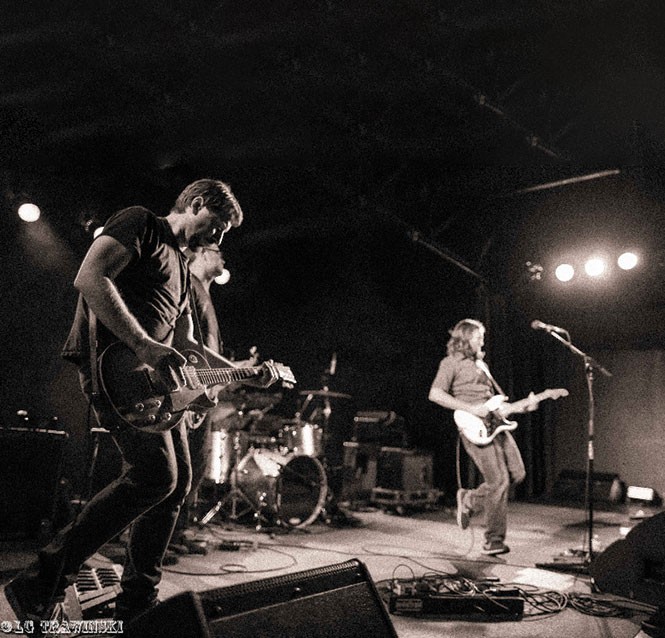
The Weekenders just might be the best local rock & roll band you've never heard. But maybe that's because they are hard to pigeonhole. It's certainly not for lack of gigging.
Vocalist/guitarist Rob Reinfurt started the band in 2009 and, on his own, recorded a debut album, Don't Plan On, in 2012. After several lineup changes, and feeling that the release's sound could use improvement, he met guitarist/studio wiz Mike Sasich (whom you can't swing the proverbial cat and not hit in the local music scene), who mixed and mastered the album. Later, the band solidified with the addition of bassist Mike Torgerson and drummer Shaun Thomas.
While they haven't received a lot of attention in the local press, they perform consistently, especially at The State Room. What's more, they've opened for some interesting national acts, including The Budos Band; Blitzen Trapper and Freeman, a solo project of Aaron Freeman (aka Gene Ween of the band Ween). The Weekenders don't really sound like any of those, and Reinfurt says it's awkward. "A lot of times, people have trouble fitting us into a bill because a lot of bands are quite softer," he says. "And then the bands that are heavier are usually on the metal side, and that's not what we are at all."
The band releases its second album, Bright Silence of Night, on April 29 with two sets at The State Room (one accompanied by modern dancers, with choreography by Erica Womack). Sasich notes that the new songs came together easily. "With this group," he says, "songs just kind of happen; we don't go through the music with a fine pick. It just kind of happens, and I think that's the beauty of playing with people that you have good chemistry with." That's how they chose their name, which comes from a line in Lou Reed's "Perfect Day": "Just a perfect day/ problems left all alone/ weekenders on our own/ it's such fun."
Reminiscent of 1970s hard rock, before heavy metal came and pushed everything into screaming, The Weekenders slog away in sheer sonic tumult, creating a sound that is updated for the Pro Tools/GarageBand generation: more refined, but still rough. The album opener, "Escape," starts with an ominous-sounding, slow and steady kick drum. Reinfurt's arching vocal, that at times reaches into falsetto, and Sasich's retro guitar pyrotechnics combine in an awe-inspiring blend, that's mind-bending without being psychedelic, heavy without being leaden. Reinfurt sings, "You can let your guard down, baby," but it's the music that really entices.
"New York Bound" would be perhaps an indie-rock Led Zeppelin blues merchant, letting the listener ride its groove. The trebly guitar sound places this music as somewhere outside the '70s, but its heredity leads surely back there, bell-bottoms and all. "Cherokee Rose" is the outlier of the bunch, muted guitar lines as sure as the carefully delineated portrait of the title character, once again with ties to similar '70s subjects. Sasich's playing is as controlled as always, though at times on the album he really stretches out, as does Reinfurt with his vocals.
That's perhaps the most surprising thing about the album: It's such a work of art. The Hendrix-isms of "Every Night As A Slave," the indictment of the fashion followers on "Monkey See" and the stately intro to "Blue Hill Bay" all maintain a kind of precision that bucks the myth of hard rock as a kind of anti-genre more defined by the excesses of its practitioners—at least in its original manifestation, more than simply bearing sonic similarities.
There is a kind of effortlessness and unself-conscious energy to the album, and the band—such that their name really fits. Although they completed the album moments before we spoke, they don't seem to realize how good it is. "When I have been working on something, and am really close to it, I don't really get to hear it, in a sense, until later," Sasich says. "Sometimes it's not being able to see the forest for the trees."